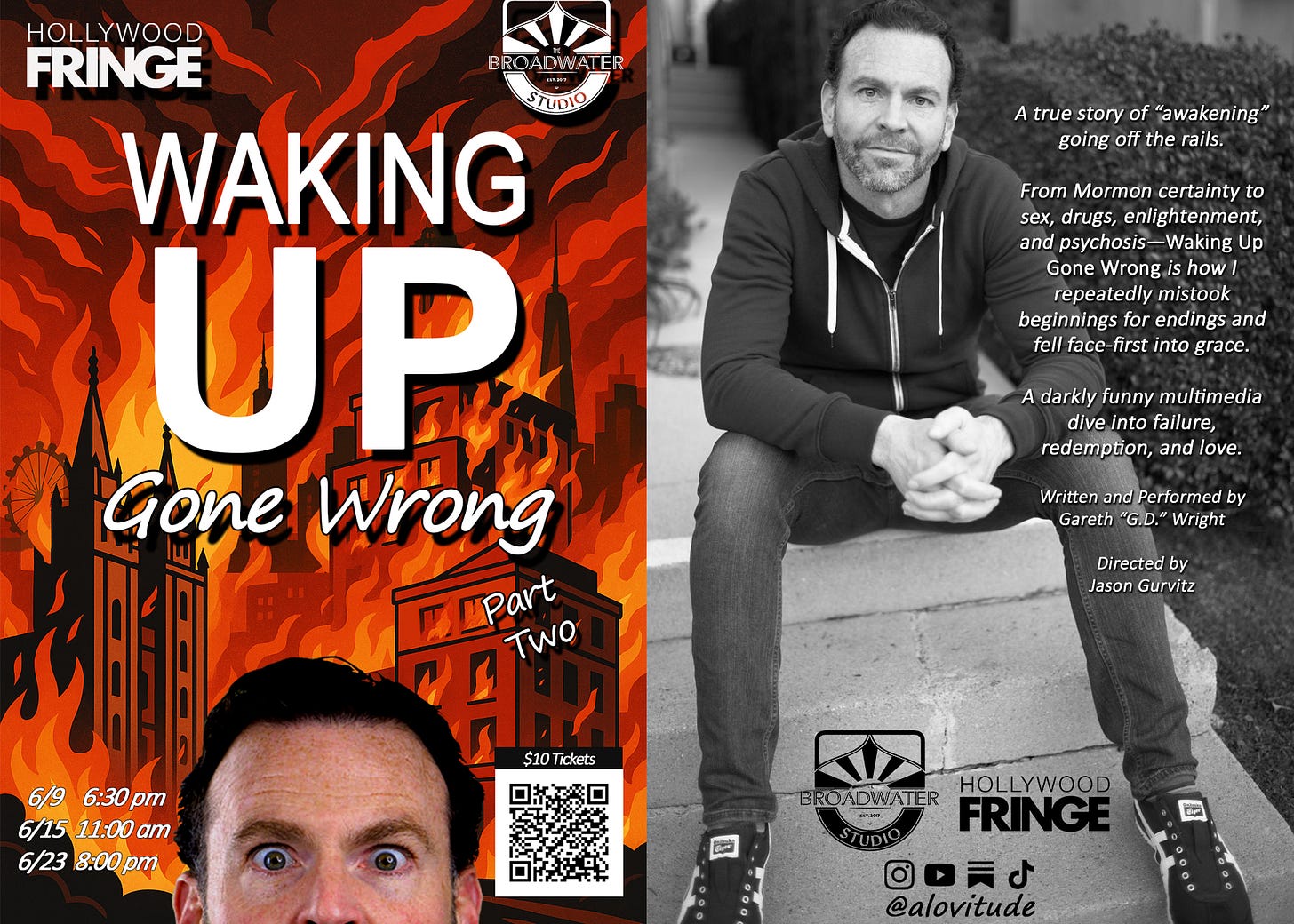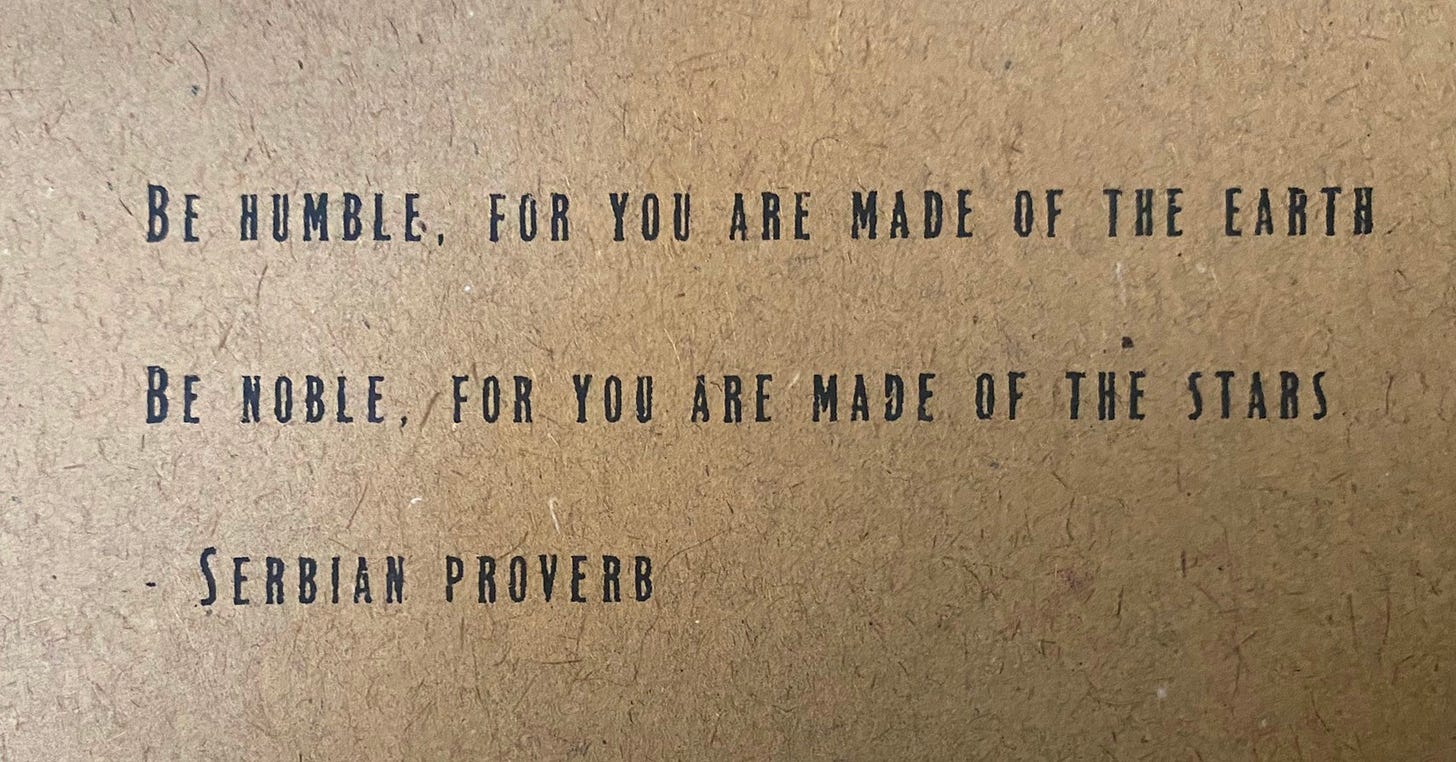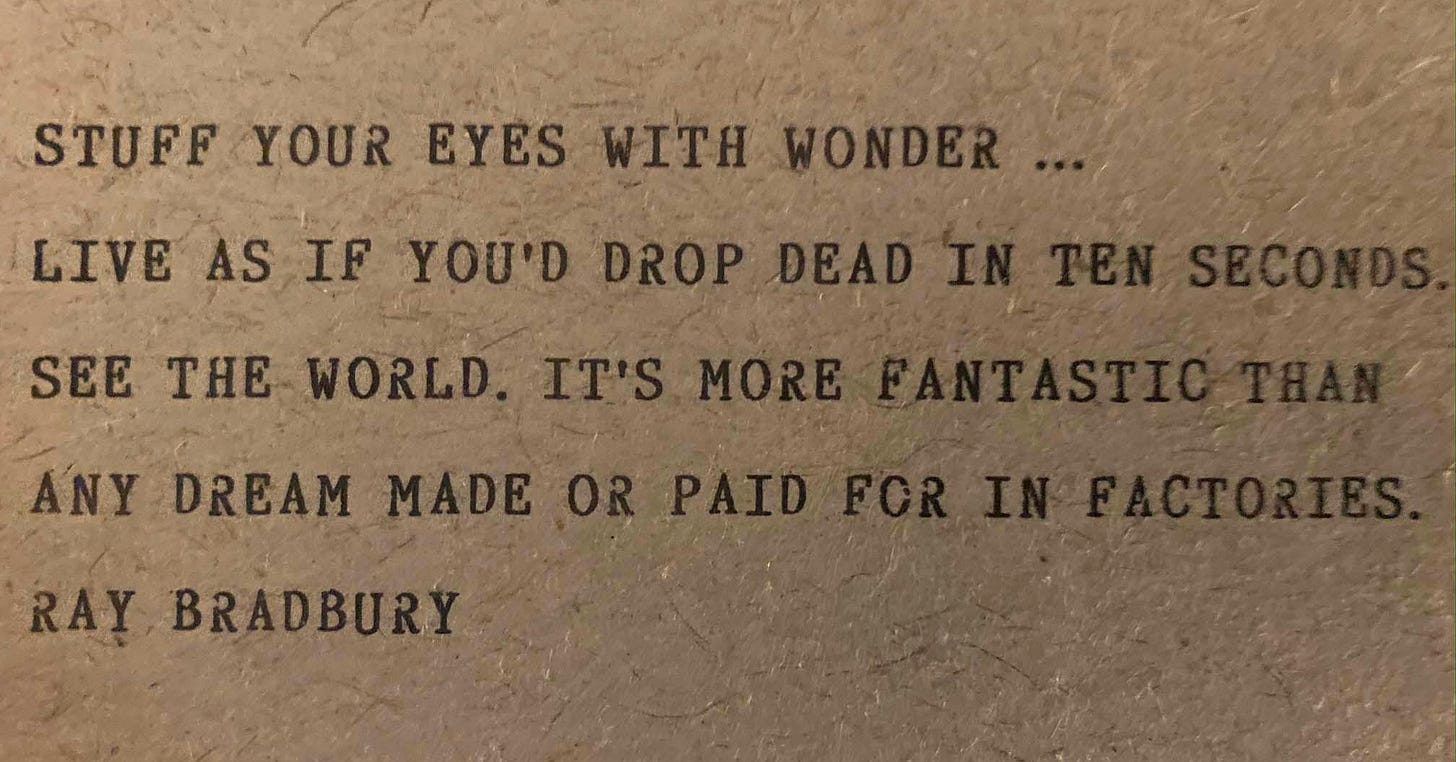Waking Up Gone Wrong
Show Links (Or: Why I've been slacking on Substacking)
Shortly after launching my Substack I decided to put on a one-person show at the Hollywood Fringe festival. (If you went to the show, THANK YOU!)
In the show I reference books and other resources that I found valuable. Here are links to everything I mentioned—and loads more that I didn’t.
The Book of Mormon and The Bible1 were undoubtedly the most important books of my childhood. (Followed by Calvin & Hobbs comic strip books and those choose-your-own-adventure books where I always managed to pick the “you fell off a cliff” path first and had to rewind and try again.)
Three weeks after 9/11, I moved from my depressing apartment in Battery Park City that looked out onto the Trade Center rubble into an apartment in Murray Hill with three other LDS guys. As I struggled in my new life as a grunt at an investment bank during a recession, a coworker suggested I read:
Man’s Search for Meaning, by Viktor Frankl. Frankl survived the Holocaust by following his intuition over “rational” thinking and went on to create a flavor of therapy that focused on meaning-making.
Some fifteen years later my slow-descent into therapy started with a book on attachment disorder:
Attached: The New Science of Adult Attachment and How it Can Help you Find—and Keep—Love by Amir Levine and Rachel Heller (2010)
In practical terms, being the “happiest” of my mother’s six babies means I was the least work for her (i.e. I didn’t cry much and wasn’t demanding…) so it’s highly likely I wasn’t held a lot in my early months. (I still recoil when touched unexpectedly.)
I fit neatly into the “anxious-avoidant” attachment type. It was the gateway drug to getting into “mommy-issues” therapy—aka “family-of-origin” work.
The first “spiritual” book I came across is the most common one:
The Power of Now: A Guide to Spiritual Enlightenment by Eckhart Tolle (1997)
But it was his second book that hit harder:
A New Earth: Awakening to Your Life’s Purpose (2005). And, as a bonus, the:
Also, did you know that Tolle had a book in-between his two big ones?
Stillness Speaks (2003) (But be warned, do you know what else speaks? Full-blown psychosis. Wink wink.)
I read The Power of Now at the same time as “the trauma bible”:
The Body Keeps the Score: Brain, Mind, and Body in the Healing of Trauma by Bessel van der Kolk (2014)
and a book on recovery written for people more comfortable using the twelve-steps of Alcoholics Anonymous replacing God with the F-word:
Recovery: Freedom From our Addictions by Russell Brand (2017).2
It was a powerful throuple that opened my mind to the potent combination of spirituality, science, and action.
After decades focusing on analytical thinking, my shift back into feeling started with:
Daring Greatly: How the Courage to Be Vulnerable Transforms the Way We Live, Love, Parent, and Lead by Brené Brown (2012)—or go directly to her:
A key step in understanding feelings and emotions was:
How Emotions Are Made: The Secret Life of the Brain by Lisa Feldman Barrett (2017) or skip to her:
Mark Manson was a surprise entry in learning the balance between body and mind. I can’t remember if it was in a book or an essay or on a podcast but he pointed out the common tendency of rational-minded people (usually men) to overcorrect into emotional/feeling spaces (possibly with the assistance of “plant medicines”).
It feels SO GOOD to feel after not feeling for so long. But once you’ve realized it’s okay to feel, best get a feel for using your brain again.
The Subtle Art of Not Giving a F*ck: A Counterintuitive Approach to Living a Good Life by Mark Manson (2016) and
Everything is F*cked: A Book About Hope by Mark Manson (2019). He also has some great essays, like this one about letting go.
The book that has had the most practical impact on my life is:
Nonviolent Communication: A Language of Life by Marshall B. Rosenberg (1999).
It was an absolute game changer when it comes to practical, lived spirituality. (It may not be marketed as “spiritual,” but tuning into your needs and the needs of others is deep spiritual practice imo.)
Continuing with “emotional discovery,” Esther Perel’s books were key for working with the sexual dysfunction that came from a shame-filled religious upbringing:
For trauma-processing, Peter Levine is the godfather. His book:
In an Unspoken Voice: How the Body Releases Trauma and Restores Goodness (2010) details the process of identifying body-based trauma (via “pendulation” and “titration”) and releasing it through a process of “unwinding.”
Levine has his own system and workshops called Somatic Experiencing, which I haven’t tried, but I recommend:
The Biodynamic Breathwork Trauma Release System. I did an in-person training workshop before the pandemic. They now offer in-person and remote. There are also free weekly group breath sessions on Zoom.
Details for the “active” meditations I mentioned can be found here. I primarily did the “chakra” meditation, and the music is available on Spotify or to buy on Amazon. And if you’re wondering, wait, that name Osho sounds familiar… yes, he’s the same Bhagwan Shree Rajneesh from the Netflix doc Wild Wild Country.
Don’t throw the breathwork baby out with the cult-leader bathwater.
For the final part of the mind/body section, if you’re into the workshop scene:
I first did the Awareness Institute Summer series, then the Living Centered program at On Site in Nashville. Then one with Mormons (and ex-Mormons?) near Salt Lake City. And then one naked in Joshua Tree. As far as I can tell, all of these (plus Landmark Forum and Hoffman Process) are all downstream of the original EST workshops from the 70s. Be wary of workshops with pushy recruitment processes. (You can’t always “trust the process.”3)
For the a metaphysical/unreal turn, for me it started with the BBTRS workshop and then, a month later, I came across:
The Case Against Reality: Why Evolution Hid the Truth from Our Eyes by Donald Hoffman (2019).
He has some amazing podcast chats with Rupert Spira that I will hopefully link have now linked to. Spira also has great talks with Bernardo Kastrup, the creator of the Essentia Foundation and author of an amazing short book about “analytical idealism”—a specific flavor of “conscious monism.”
Analytic Idealism in a Nutshell: A straightforward summary of the 21st century’s only plausible metaphysics by Bernardo Kastrup
Also on a podcast, I stumbled across Frank Ostaseski author of:
Links to come for his work with the Metta Institute and the Zen Hospice Project but he quotes Ram Dass—and it’s one my all-time favorites. I used part of it in the show, but the entire thing is:
After many years of undergoing psychoanalysis, teaching psychology, working as a psychotherapist, taking drugs, being in India, being a yogi, having a guru, and meditating for decades, as far as I can see I haven't gotten rid of one neurosis. Not one. The only thing that changed is that they don't define me anymore. There is less energy invested in my personality, so it is easier to change. My neuroses are not huge monsters anymore. Now they are like little shmoos that I invite over for tea.
I will admit that Ram Dass’s words had never really resonated for me… first off, he’s a theist. His devotion to “Ram” and his Guru (who looks like the lovechild of Yoda and Jabba the Hut), smacks of confirmation bias and wishful thinking. (He did acid and didn’t feel it! Twice!) At the very least it supports the notion that the best teacher/guru is at least four villages away. (i.e. You’re teacher poops too!)
But two of Ram Dass’s books are seminal4:
Be Here Now (1971)
Be Love Now: The Path of the Heart (2010) by Ram Dass, Rameshwar Das
Any mention of Ram Dass is a good time to bring up psychedelics.
How to Change Your Mind: The New Science of Psychedelics by
Michael Pollan (2018)
Pollan may have made psychedelics great again but I preferred
Food of the Gods: The Search for the Original Tree of Knowledge
by Terence McKenna (1992)
While reality still seemed mostly viable, I came across Carlo Rovelli’s amazing books (in reverse order of my preference):
The Order of Time (2017) But get the audiobook: it’s read by Benedict Cumberbatch. Listening to him read it immediately adds ten points to your IQ.
Reality is Not What it Seems: The Journey to Quantum Gravity by Carlo Rovelli (2021)
Helgoland: Making Sense of the Quantum Revolution by Carlo Rovelli (2022)
Helgoland is a tiny book but is one of the most beautiful and poetic I’ve ever read—and it’s about Quantum Mechanics! On a related note I should grudgingly include:
Something Deeply Hidden: Quantum Worlds and the Emergence of Spacetime by Sean Carroll even though I don’t think I ever finished it and Sean Carroll sounds like a giant douche on nearly every podcast I’ve heard with him.
While we’re in the weird-science section, we can cover the book I quote to end my Fringe show:
Behave: The Biology of Humans at Our Best and Worst by Robert Sapolsky (2017) he also has a newer book fully on determinism that I haven’t finished:
Determined: A Science of Life without Free Will (2023) and any conversation about free will would be incomplete without Sam Harris’s little book:
Free Will by Sam Harris (2012)
Speaking of Sam Harris, I highly recommend his Waking Up app for the best secular approach to “spirituality” you will find—and the book:
Waking Up: A Guide to Spirituality Without Religion by Sam Harris (2014)
When the lack of free will sinks in, letting go / surrender usually follows. So, of course, these two factored:
Letting Go: The Pathway of Surrender by David R. Hawkins (2014)
The Surrender Experiment: My Journey into Life's Perfection by Michael A. Singer (2015)
See also Singer’s other popular books:
The Untethered Soul: The Journey Beyond Yourself by Michael A. Singer (2007), which Oprah made very famous.
Living Untethered: Beyond the Human Predicament by Michael A. Singer (2022)
The “enlightenment trap” I fell into was fueled by the pseudonymous Jed Mckenna books:
Spiritual Enlightenment: The Damnedest Thing trilogy (2002), mostly the first book but more-so:
Jed McKenna’s Theory of Everything (2013) which is sort of the obnoxious, spiritual version of The Case Against Reality.
Also, Deepak Chopra’s book:
It was a relief to read that other people have destabilizing “awaking” experiences, but it still lead me down the path of feeling “special,” which is the antithesis of spiritual realization. Which brings me to:
The Journey of Souls: Case Studies of Life Between Lives by Michael Newton (1994)
Do you want to turbo-charge your ego with eternal self-importance? Look no further! It’s a fun contemplation but my take is: if past lives are real (which is an increasingly rational assumption to make in a consciousness-as-fundamental universe) AND I’m still here, then I’ve probably got more to learn from this life.
I shared a Ray Bradbury quote5 in the show, but I didn’t share (and didn’t heed) this Serbian proverb I pulled after a therapy session while blasting off before Covid hit.
Good time to reference a more recent entry that helped bring me back to solid ground:
Near Enemies of the Truth: Avoid the Pitfalls of the Spiritual Life and Become Radically Free by Christopher D. Wallis, which is sort of a modern extension of the seventies classic:
Cutting Through Spiritual Materialism by Chögyam Trungpa. (If you thought Osho was bad, brace yourself. Trungpa was a coked-up genius.)
Or stick with Hareesh and his more in-depth book:
Tantra Illuminated: The Philosophy, History, and Practice of a Timeless Tradition by Christopher D. Wallis (2011)
Pop-culture has now picked up on all the healing modalities and commoditized them. As one of my wise teachers told me: there’s an on-ramp for everyone. But what once look like an on-ramp can quickly become a cul-de-sac. It’s possible to mistake spinning in place for making progress.
When in doubt, go with Adyashanti:
The End of Your World: Uncensored Straight Talk on The Nature of Enlightenment by Adyashanti (2010) or
Or, when all else fails, don’t do what I did.
Okay, those aren’t the real links but I prefer them.
Yeah, yeah I get that (unless you’re Christian, MAGA, or Christian MAGA) Brand may be a disappointment of late but Recovery is *way* better than The Big Book imo. (No link for The Big Book either. As books of scripture go, it’s right up there with The Book of Mormon. i.e. Outdated and boring.)
Well… in a limited sense.
Also in my transformational first “ego death” experience, I had the experience of being Ram Dass… at the same time as being Donald Trump. As the yin/yang manifestation of light/dark. So I feel a deep connection to Ram Dass. But as words go, I prefer those of Alan Watts.




